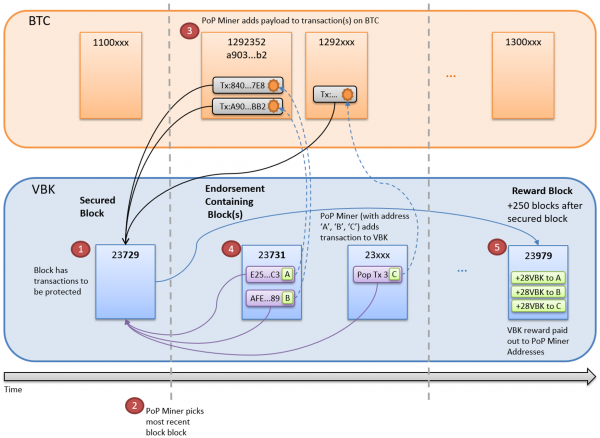PoP Transaction LifeCycle
See: Main_Page, HowTo_run_PoP_Miner
Contents
Overview
A PoP Transaction has several stages in its life cycle.
A single PoP transaction will:
- Endorse (secure) a VBK block
- Have its 80-byte payload embedded within the OP_RETURN (or through alternative means) of a BTC transaction
- Be rewarded 500 blocks after the secured block
One VBK block can:
- Contain many PoP transactions
- Be secured by many PoP transactions
- Reward many PoP transactions
Each VBK block likely plays three different roles:
- Secured Block – The block that is secured by having its block header stored in one or more Bitcoin OP_Return transactions by one or more PoP miners
- Endorsing Block(s) – The block containing the PoP Transactions that contain the block header of the Secured Block in Bitcoin
- Reward Block – The block which pays out rewards to the PoP miners who secured a particular VeriBlock block
These are relative terms. Each individual block will be secured by a future block, will endorse previous blocks, and will payout PoP rewards for PoP miners who secured a previous block.
The picture above shows:
- A block has transactions that need to be secured
- The PoP Miner picks that most recent block and aggregates its information into an 80-byte PoP Payload. The header will be the header of the “Secured Block” (say block #23729).
- The PoP Miner puts the payload in the OP_RETURN of a Bitcoin transaction.
- The PoP Miner creates a PoP Transaction that will be submitted to future VBK blocks (say block #23731). This transaction both points to the Bitcoin transaction and the prior secured block.
- 250 blocks after the secured block (#23979), the reward will be paid out by the coinbase according to the PoP reward protocol. This will be shared amongst the miners.
